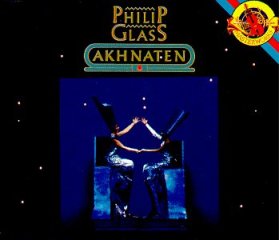Philip Glass – Akhnaten (1984)
Philip Glass – Akhnaten (1984)

Disc: 1
1. Akhnaten/Act 1. Prelude. Refrain, Verse 1, Verse 2
2. Akhnaten/Act 1. Prelude. Verse 3
3. Akhnaten/Act 1. Scene 1. Funeral of Amenhotep III
4. Akhnaten/Act 1. Scene 2. The Coronation of Akhnaten
5. Akhnaten/Act 1. Scene 3. The Window of Appearances
6. Akhnaten/Act 2. Scene 1. The Temple
7. Akhnaten/Act 2. Scene 2. Akhnaten and Nefertiti
Disc: 2
1. Akhnaten/Act 2. Scene 3. Narration. The City [Beginning]
2. Akhnaten/Act 2. Scene 3. The City/Dance (Conclusion)
3. Akhnaten/Act 2. Scene 4. Hymn
4. Akhnaten/Act 3. Scene 1. The Family
5. Akhnaten/Act 3. Scene 2. Attack and Fall
6. Akhnaten/Act 3. Scene 3. The Ruins
7. Akhnaten/Act 3. Scene 4. Epilogue
Paul Esswood (Contratenor - Akhnaten)
Melinda Liebermann (Soprano - Rainha Tye)
Milagro Vargas (Contralto - Nefertiti)
Helmut Holzapfel (Tenor - Alto Sacerdote de Amon)
Tero Hannula (Barítono - Horemhab)
Cornelius Hauptmann (Baixo - Aye)
Victoria Schneider (Soprano - Bekhetaten)
Lynne Wilhelm-Koniger (Soprano - Meretaten)
Maria Koupilova-Ticha (Soprano - Maketaten)
Geraldine Rose (Contralto - Neferneferuaten)
Angelika Schwarz (Contralto - Sotopenre)
David Warrilow (Narrador - Escriba)
Christina Wachtler (Contralto - Ankhesenpaaten)
The Stuttgart State Opera Orchestra & Chorus
Dennis Russell Davies – conductor
The last installment of Philip Glass' operatic trilogy, begun with Einstein on the Beach and continued with Satyagraha, Akhnaten also unfortunately established the sort of musical rut in which he was to be ensnared for much of the rest of the century. As with Satyagraha, he opted for a relatively traditional orchestration, with only Michael Riesman's electric keyboards supplementing the standard instrumentation, and with six main voices deployed in various configurations. Here, Glass, in his own libretto, tells the story of the man who supposedly introduced monotheism into classic Egyptian culture (and thereby the Western world), thus complimenting the realms of science and politics as portrayed in his previous two operas. Whereas in Satyagraha he used Sanskrit transcriptions of the Bhagavad-Gita to lend the work at least a tinge of an Indian atmosphere, here there is little if anything that connotes the Egyptian short, presumably, of the stagecraft in a live performance. The music by this time had taken on the "by the yard" feel of much of his work in the mid-'80s and beyond, possibly a result of simply having too many coals in the fire. Though still capable of creating the odd enchanting melody or haunting passage, most of the music sounds like a pallid rehash of previous works. The most noticeable difference is an increased used of percussion, which is all well and good, but the ponderousness of the horn writing in particular applies more weight than can be comfortably borne. The scattered lovely moments, as well as its vaunted place in his oeuvre, make this worth hearing, but it suffers greatly compared to its companions in the trilogy. ---Brian Olewnick, Rovi
download: uploaded anonfiles yandex 4shared solidfiles mediafire mega filecloudio
Zmieniony (Niedziela, 24 Listopad 2013 19:23)








